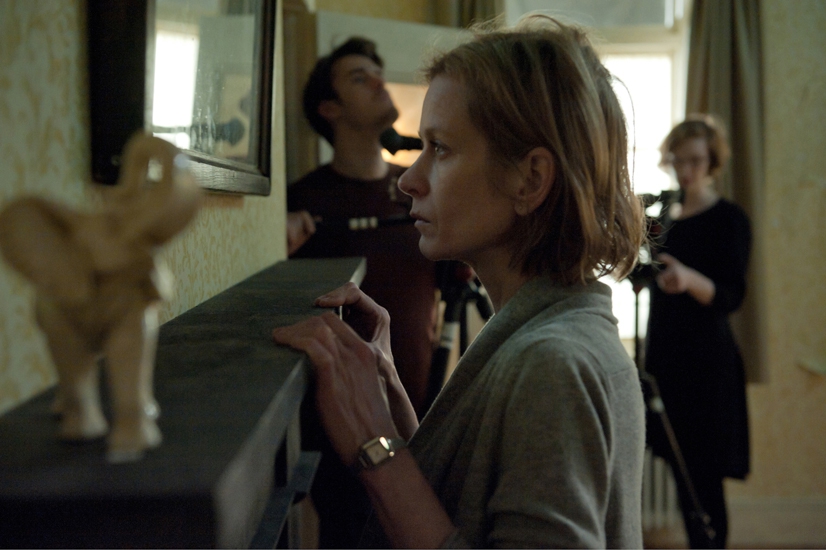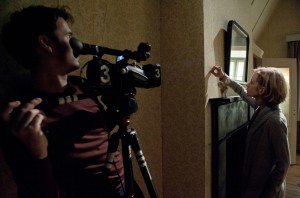
“The stage is a concrete physical place which asks to be filled, and to be given its own concrete language to speak.” – Antonin Artaud, The Theater and Its Double (1958)
We arrive early to the Schaubühne as the sky grows to an evening shade of dark blue and the street lamps begin to brighten. We order our tickets and get drinks to sip on until the doors open for the theater, smoking outside and summarizing the plot of the short story to those of us who hadn’t had the chance to read it before we left for the night. A young German man sits at the bench on the other side of the table from us, smiling as our large group of English speakers discusses the few German phrases we can muster and whether or not we might be capable of understanding any of the language. It doesn’t matter, we decide, it’s about the experience of the show. Within half an hour the doors are announced to be opening so we gulp down the rest of our coffees and head inside, attempting to ask a woman standing by the entrance how we can find out seats by pointing to the number on our tickets. She laughs and gestures in: “auf der linken Seite.” Half of us take a right and half a left, supposing someone has to guess correctly with a 50/50 chance. After fumbling with a few other German speakers (“Wo ist mein Sitzplatz?”, “Ich spreche kein Deutsch”) I finally found seat 10, row 16.
Chatter fills the small theater until the lights begin to dim and a screen before us is illuminated.
As an American student who has participated in theater for some years now (my first debut was as Mr. Tumnus in C.S. Lewis’s The Lion, the Witch, and the Wardrobe when I was eight), the concepts of German theater came as quite a shock. On the Friday previous to going to the show, our theater class (Acting and Directing taught by Julia Dittrich) studied the differences between American/English theater and German theater by watching various renditions of Shakespeare’s plays: A Midsummer Night’s Dream, Twelfth Night, and Macbeth. Before this hour and a half Friday session, I had always figured theater was relatively similar in most parts of the world, at least within Western culture, but afterwards I couldn’t have believed something more different. For those of you who haven’t had any experience with German theater, which was me up until last week, the best words I have to describe it are “experimental” and “unpredictable.” The idea of “Epic Theater” as popularized in Germany after World War I consists in almost obtrusively reminding the audience that they are viewing a performance, not something real. This is mainly embodied in the prevalence of all stage technology and crew: the wire for microphones and lights are clearly visible, cameras are set up to show the production of screens, costumes are unrealistic, and the fourth wall is frequently broken. One of the main proponents of “Epic Theater” was director Bertolt Brecht (1898-1956), who believed in creating in the audience the alienation and objectivity that would allow them to learn the truth about society through theater. And thus German Fringe Theater (non-mainstream performances) grew into what it is today.
After witnessing the examples of German theater shown to us, my classmates and I were both skeptical and incredibly interested to experience it for ourselves. When we heard that a rendition of Charlotte Perkins Gilman’s short story “The Yellow Wallpaper” was to show at the Schaubühne the next Thursday and Friday we hopped on our chance to see a familiar story acted out in an unfamilar language. Our main curiousity was this: could we still learn a “truth about society“ if we couldn’t understand any dialogue?

Once the show began, this question moved to the back of my mind as I became absorbed by how unrecognizable the stage set-up was to me. Sitting excitedly in my seat, I began to recycle ideas through my mind about how I would be writing an article on my experience with the German language. However, within a few minutes, I realized that it wasn’t just the language that was foreign to me in this theater; the entire stage, set and presence were foreign. My mind continually formed sentences about how cameras and their camera crew littered the stage, turning the theater set into a small-scale film production. A screen raised above the stage showed intimate close-ups of the actors and various film clips from the characters’ “pasts“ and thus the focus of the show was drawn away from the movement of the actors on the stage, frequently blocked by the cameramen, and was placed instead upon the screen. Only once before had I witnessed the use of technology in this way. It was during a production of “Jersey Boys” but the screens had been pieces of the backdrop, changing for the sake of the setting rather than actually being the main stage. But without this quality, the show would have been much more difficult to understand for us English speakers. (Having only been in Berlin for eight weeks and taking language classes for only three, my converstational German is typically limited to: „Guten Tag! Wie geht’s? Dein Haar ist braun.“ And my fellow theater students, consisting of first years and Bard third years were primarily on the same level.) Thus, I could probably order myself a glass of water with little trouble, but understand the complexity of this late 19th-century story that contains concepts pertaining to feminism, insanity, and society? I’m not sure A1 is quite at that level.
Here is where the unique quirks of German theater pulled through. With the barrier of language obstructing my understanding, the cameras opened up a different gate: by bringing the actors into close view, their hurt, sorrow, madness, fear, strength, determination and confusion were amplified and visible. I no longer needed the language to comprehend the thoughts and emotions of Anna, the lead character. The whole story takes place within Anna’s mind while she spends her time stuck inside the attic room of her and her husband’s country home as she attemps to cure herself of her illness. The slow decimation of her mind and her obssession with the peculiar yellow wallpaper and the creeping women hidden inside it leads up to the freedom from societal constraints she achieves by becoming herself one of the women in the wallpaper. All this was conveyed even without a comprehensible understanding of German. And it was by toying with the qualities of theater and film production that such an intimacy was achieved. Rather than being just an audience member, the camera made you feel as though you were intruding on the very personal lives and thoughts of the characters, allowing you to become indistinguishable from those lives and thoughts. Yet Brecht’s alienation was still present; I was vividly aware of the fact that I was watching a show and not real life, but somehow that seemed to increase my connection to the concepts of the short story. Rather than being involved in the plot, I was involved in the ideas because it was those that became the main characters of the show. Costuming and complex sets were not there to distract me from the point Charlotte Perkins Gilman wanted to convey with her writing.
The lights returned slowly and eyes readjusted to the brightness after 75 minutes of dim stage lights. The audience applauded and the actors took their bows once, twice, five times until finally the clapping began to die out, coats were pulled over shoulders, bags lifted from under chairs and shuffling towards to the door commenced. We all met up at the table we had started the evening at. The sky had darkened further and the lights of cars flashed by us in a hurried motion as we slowly meandered towards our bus stop. As we discussed the show, everyone could agree that the only sentence we really understood was “Du bist so schön” and yet it was still one of the most interesting performances we had ever seen. The theater had created its own language that any person, in any place, in any time, can understand. As I continue to learn German during my time as a student at ECLA of Bard, it is my experience with art throughout Berlin, from gallery openings to professional plays, that will teach me how to understand this vibrant city, even if the words don’t make any sense.
